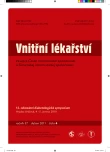-
Medical journals
- Career
Incretin therapy and the metabolic syndrome
Authors: Š. Svačina
Authors‘ workplace: III. interní klinika 1. lékařské fakulty UK a VFN Praha, přednosta prof. MUDr. Štěpán Svačina, DrSc., MBA
Published in: Vnitř Lék 2011; 57(4): 417-421
Category: 12th national Symposium diabetes, "Diabetes and Gastroenterology", Hradec Kralove, 4 to 5 June 2010
Overview
Incretin therapy includes treatment with incretin analogues (exenatid and liraglutid) and so called incretin enhancers (gliptins and DPP-4 inhibitors respectively – sitagliptin, vildagliptin, saxagliptin, linagliptin). In patients with type 2 diabetes, this novel anti-diabetic treatment usually leads to successful reduction in fasting as well as postprandial glycaemia and glycosylated haemoglobin. At the same time, it importantly improves all components of metabolic syndrome (dyslipidemia, hypertension, systemic inflammation). Incretin analogues also reduce body weight while DPP-4 inhibitors are weight-neutral. Both groups of drugs are expected to have positive cardiovascular effects, although it is not clear whether these are likely to be direct or indirect, i.e. facilitated by improved compensation of metabolic syndrome components.
Key words:
type 2 diabetes mellitus – incretin analogues – gliptins – exenatid – liraglutid – sitagliptin – vildagliptin – saxagliptin – linagliptin – obesity – metabolit syndrome
Sources
1. Svačina Š. Diabetologie. 1. vyd. Edice Lékařské repetitorium. Sv. 2. Praha: Triton 2010.
2. Svačina Š et al. Metabolický syndrom. Praha: Triton 2010.
3. Haluzík M, Svačina Š. Inkretinová léčba diabetu. 1. vyd. Praha: Mladá Fronta 2010.
4. Svačina Š. Postavení metforminu jako antidiabetika první volby. Vnitř Lék 2010; 56 : 1225–1227.
5. Svačina Š. Potenciální nová antidiabetika v příštím desetiletí. Vnitř Lék 2009; 55 : 429–433.
6. Svačina Š. Hypertenze při obezitě a diabetu. Praha: Triton 2007.
7. Widimský J jr, Slíva J. Přímé inhibitory reninu: nová léková skupina antihypertenziv. Farmakoterapie 2008; 8 : 569–571.
8. Rizzo M, Rizvi AA, Spinas GA et al. Glucose lowering and anti-atherogenic effects of incretin-based therapies: GLP-1 analogues and DPP-4-inhibitors. Expert Opin Investig Drugs 2009; 18 : 1495–1503.
9. Mistry GC, Maes AL, Lasseter KC et al. Effect of sitagliptin, a dipeptidyl peptidase-4 inhibitor, on blood pressure in nondiabetic patients with mild to moderate hypertension. J Clin Pharmacol 2008; 48 : 592–598.
10. Bhushan R, Elkind-Hirsch KE, Bhushan M et al. Exenatide use in the management of metabolic syndrome: a retrospective database study. Endocr Pract 2008; 14 : 993–999.
11. Moretto TJ, Milton DR, Ridge TD et al. Efficacy and tolerability of exenatide monotherapy over 24 weeks in antidiabetic drug-naive patients with type 2 diabetes: a randomized, double-blind, placebo-controlled, parallel-group study. Clin Ther 2008; 30 : 1448–1460.
12. Gill A, Hoogwerf BJ, Burger J et al. Effect of exenatide on heart rate and blood pressure in subjects with type 2 diabetes mellitus: a double-blind, placebo-controlled, randomized pilot study. Cardiovasc Diabetol 2010; 9 : 632.
13. Patel A. ADVANCE Collaborative Group. Effects of a fixed combination of perindopril and indapamide on macrovascular and microvascular outcomes in patients with type 2 diabetes mellitus (the ADVANCE trial): a randomised controlled trial. Lancet 2007; 370 : 829–840.
14. Svačina Š. Léčba obézního diabetika. Vnitř Lék 2010; 56 : 1078–1081.
15. Klonoff DC, Buse JB, Nielsen LL et al. Exenatide effects on diabetes, obesity, cardiovascular risk factors and hepatic biomarkers in patients with type 2 diabetes treated for at least 3 years. Curr Med Res Opin 2008; 24 : 275–286.
16. Astrup A, Rössner S, Van Gaal L et al. NN8022–1807 Study Group. Effects of liraglutide in the treatment of obesity: a randomised, double-blind, placebo-controlled study. Lancet 2009; 374 : 1606–1616.
17. Grieve DJ, Cassidy RS, Green BD. Emerging cardiovascular actions of the incretin hormone glucagon-like peptide-1: potential therapeutic benefits beyond glycaemic control? Br J Pharmacol 2009; 157 : 1340–1351.
18. Chilton R et al. Weight loss, glycemic control, and changes in cardiovascular biomarkers in patients with type 2 diabetes receiving incretin therapies or insulin in a large cohort database. Diabetes Care 2010; 33 : 1759–1765.
19. Juntti-Berggren L, Pigon J, Karpe F et al. The antidiabetogenic effect of GLP-1 is maintained during a 7-day treatment period and improves diabetic dyslipoproteinemia in NIDDM patients. Diabetes Care 1996; 19 : 1200–1206.
20. Horton ES et al. Weight loss, glycemic control, and changes in cardiovascular biomarkers in patients with type 2 diabetes receiving incretin therapies or insulin in a large cohort database. Am J Med 2011; 124 (1 Suppl): S35–S53.
21. Bosi E, et al. Presented at ADA Annual Meeting, June 22-26, 2007; Chicago, IL. Abstract 521-P
Labels
Diabetology Endocrinology Internal medicine
Article was published inInternal Medicine

2011 Issue 4-
All articles in this issue
- Diabetes mellitus and the oral cavity
- Xerostomia, hyposialia, sicca syndrome – quantitative disturbances of the salivary flow rate
- Peptic ulcer disease in patients with diabetes mellitus
- Motility disorders and gastric emptying in diabetes mellitus. Current diagnostics and treatment
- Current trends of surgical therapy of focal liver and pancreatic lesions
- Steatosis and steatohepatitis in diabetic patient
- Diabetes mellitus and the liver cirrhosis
- Acute pancreatitis in diabetics
- Coeliac disease and diabetes
- Colorectal cancer and diabetes
- Analogues of amylin, α-glucosidase inhibitors and the digestive system in homeostasis regulation
- Autonomic neuropathy of the gastrointestinal tract
- Dyspeptic syndrome associated with antidiabetic therapy
- Metabolic surgery – the most effective diabetes treatment
- Metabolic surgery – a new approach to the management of selected diseases
- Incretin hormones
- Treatment of type 2 diabetes mellitus with GLP-1 antagonists
- Incretin therapy and the metabolic syndrome
- Internal Medicine
- Journal archive
- Current issue
- Online only
- About the journal
Most read in this issue- Xerostomia, hyposialia, sicca syndrome – quantitative disturbances of the salivary flow rate
- Treatment of type 2 diabetes mellitus with GLP-1 antagonists
- Autonomic neuropathy of the gastrointestinal tract
- Diabetes mellitus and the liver cirrhosis
Login#ADS_BOTTOM_SCRIPTS#Forgotten passwordEnter the email address that you registered with. We will send you instructions on how to set a new password.
- Career

